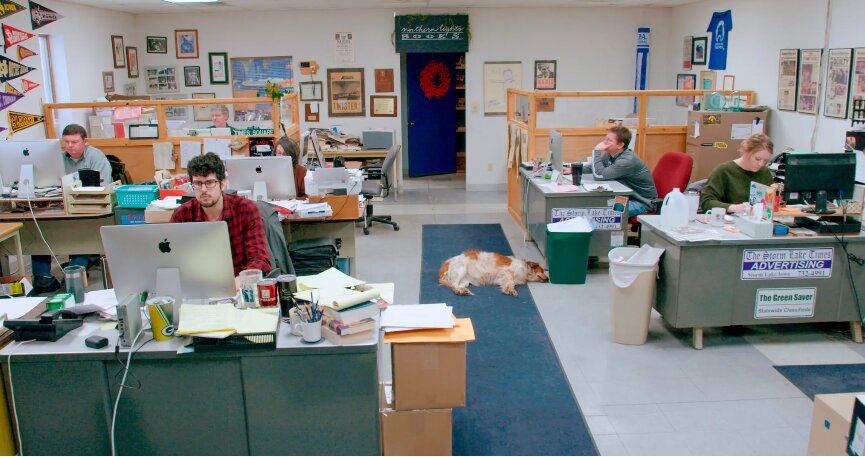
Tax credits for preserving and adding newsroom jobs are the most direct way for policymakers to help save local journalism.
Four years after these credits were proposed in Congress, New York on Saturday, April 21, approved a state-level version.

Proponents hope this becomes a model for other states and prods Congress finally to provide such credits nationally, before much more of the local press system is lost.
“We are really excited not only that this is the first tax credit like this in the country but that we’ve done it in a way that I believe totally preserves journalistic integrity,” said Zack Richner, whose family publishes two dozen local newspapers and prints others at a Long Island facility.
Richner in February organized a coalition of more than 200 newspapers to advance a tax proposal that had been lingering in the state capital.
Their lobbying drew support from national journalism advocates, including labor unions, Microsoft and the Rebuild Local News Coalition. The credits were included in the $237 billion state budget on Saturday.
New York budgeted $30 million per year over three years for the credits.
Final details will be sorted in coming months by the state’s economic development office.
Broadly, the budget provides $13 million per year for outlets employing fewer than 100 employees, $13 million for outlets with more than 100 and another $4 million to incentivize hiring more journalists.
Media outlets may receive up to $50,000 in refundable tax credits per journalist, providing up to $300,000 per outlet.
They may receive up to $20,000 more in credits for additional journalists hired, with a total cap of $320,000 per outlet.
New York has the most journalists per capita among states. It is home to several prominent national newspapers but the state is mostly served by smaller outlets experiencing the same economic crisis as the overall industry.
“A thriving local news industry is vital to the health of our democracy and it’s our responsibility to help ensure New Yorkers have access to independent and community-focused journalism,” state Sen. Brad Hoylman-Sigal, who sponsored the tax credit bill, said in the Empire State Local News Coalition announcement.
Similar credits are proposed in Illinois, where the state Senate on April 17 approved a package of policies to help its news industry.
New York and Illinois have income taxes against which the credits are applied.
Washington has a gross receipts tax on business. Last April the Legislature waived this business and occupation tax on publishers for 10 years, saving them an estimated $10 million.
In Congress, the credits were reintroduced last July as the Community News and Small Business Support Act, by U.S. Reps. Claudia Tenney, a New York Republican, and Suzan DelBene, a Washington Democrat.
Press Forward local news grants: Seven months after launching a $500 million fund to help save local journalism, the Press Forward alliance of philanthropies is soliciting grant applications from local news outlets.
Press Forward announced this week that it will give $100,000 grants to around 100 news outlets, with applications being taken from April 30 to June 12.
Dale Anglin, Press Forward’s director, said one of its guiding principles is equity and these grants are part of that emphasis.
They are intended to support outlets serving underserved communities, though Press Forward isn’t prescriptive about what that means.
“Your community could be LGBTQ, your community could be Black, your community could be three counties (or) three neighborhoods on the west side of your county, right?” she said. “It could be a language group.”
Press Forward will “see what comes in” through the application process.
“We’re kind of letting people define it. It forces you to define your audience,” she said. “You tell us, because I can’t completely dictate this.”
The grants are a commitment of $10 million over a two-year period.
They follow $48 million of grants that Press Forward announced in December, mostly for “infrastructure” including donations to advocacy, training and smaller grant-making organizations.
Led by the MacArthur and Knight foundations, Press Forward launched in September with a commitment to provide $500 million over five years. It since added 17 local chapters and built a coalition of 57 local and national funders, aiming to raise perhaps $1 billion.
Press Forward’s announcement said the grants are for “local news outlets that fill coverage gaps with original reporting” and recipients must have a total budget below $1 million.
That limits them to a small portion of America’s local news organizations and those employing relatively few people. For context, there are roughly 550 digital news outlets, mostly in metro areas, and 6,000 or so newspapers providing local coverage.
Even if they’re flirting with bankruptcy, small daily or large weekly newspapers may have budgets exceeding $1 million.
Washington has numerous small weeklies with budgets under $1 million, such as papers employing perhaps three people, said Fred Obee, executive director of the Washington Newspapers Publishers Association.
Those little papers are “scratching along on pretty minimal amounts of dollars,” he said.
“But of course even just medium-sized weekly newspapers are usually way more than that,” he added. “Say, like, a 3,000 to 6,000 circulation weekly is generally going to have revenues in excess of a million bucks.”
So while Press Forward is playing an important role in supporting the industry and encouraging additional philanthropic support, it’s also clear that much more is needed to stabilize and regrow America’s gutted local press system.
Penny Abernathy, who initiated “news desert” research documenting the local news crisis, noted this during a Tuesday event marking her retirement from Northwestern University’s Medill School.
“The problem is if you look at newspapers, newspapers have lost around $40 billion of revenue a year,” she said, “and a billion over five years is a small drop.”
This is excerpted from the free, weekly Voices for a Free Press newsletter. Sign up to receive it at the Save the Free Press website, st.news/SavetheFreePress.
Brier Dudley on Twitter: @BrierDudley is editor of The Seattle Times Save the Free Press Initiative. Its weekly newsletter: https://st.news/FreePressNewsletter. Reach him at bdudley@seattletimes.com.
Comments
No comments on this item Please log in to comment by clicking here